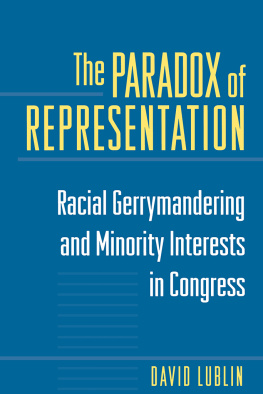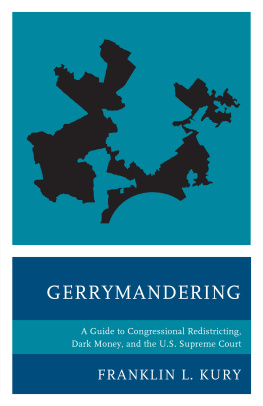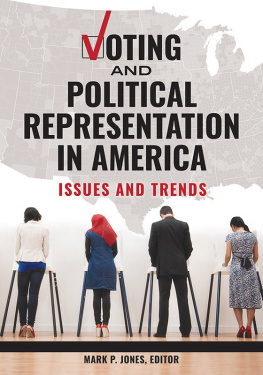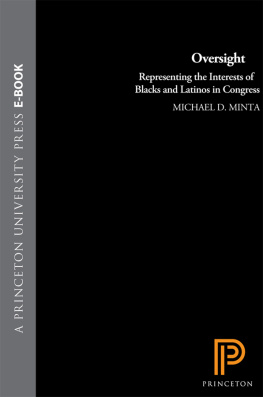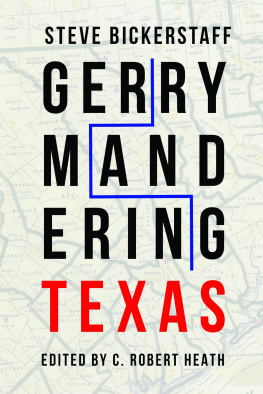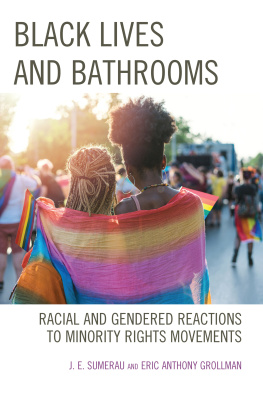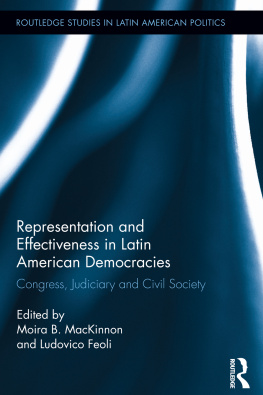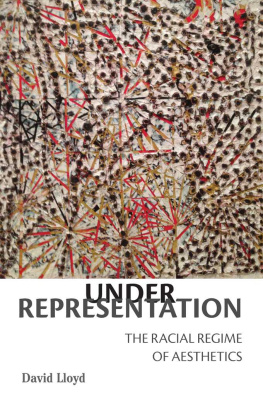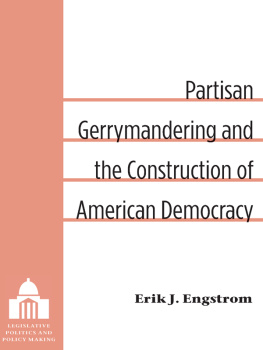COPYRIGHT 1997 BY PRINCETON UNIVERSITY PRESS
PUBLISHED BY PRINCETON UNIVERSITY PRESS, 41 WILLIAM STREET,
PRINCETON, NEW JERSEY 08540
IN THE UNITED KINGDOM: PRINCETON UNIVERSITY PRESS,
CHICHESTER, WEST SUSSEX
ALL RIGHTS RESERVED
SECOND PRINTING, AND FIRST PAPERBACK PRINTING, 1999
PAPERBACK ISBN 0-691-01010-2
THE LIBRARY OF CONGRESS HAS CATALOGED THE CLOTH EDITION OF THIS BOOK AS FOLLOWS
LUBLIN, DAVID, 1968-
THE PARADOX OF REPRESENTATION : RACIAL GERRYMANDERING
AND MINORITY INTERESTS IN CONGRESS / DAVID LUBLIN.
P. CM.
INCLUDES BIBLIOGRAPHICAL REFERENCES (P. ) AND INDEX.
ISBN 0-691-02669-6 (ALK. PAPER)
eISBN: 978-0-69122-139-7 (EBOOK)
1. GERRYMANDERINGUNITED STATES.
2. UNITED STATES. CONGRESS. HOUSEELECTION DISTRICTS.
3. ELECTION DISTRICTSUNITED STATES. 4. AFRO-AMERICAN LEGISLATORS
5. HISPANIC AMERICAN LEGISLATORS. I. TITLE.
JK1341.L83 1997 328.73073455dc21 96-45560
R0
PREFACE
T HE VOTING RIGHTS ACT of 1965 marked a key victory of the civil rights movement. Thanks to this ground-breaking legislation, African Americans no longer face mortal danger in exercising their right to vote. African-American and Latino struggles to gain representation have shifted from ballot access to redistricting since 1965. The Voting Rights Act, as amended in 1982, effectively forced states to maximize the number of majority-minority districts during the 1990 redistricting round.
Supporters as well as opponents of racial redistricting invoke the language and goals of the civil rights movement in order to legitimate their position. Opponents denounce racial redistricting as fundamentally inimical to the goal of a racially blind society. Racial redistricting, they argue, amounts to political segregation that can only further fragment and racialize American politics. Civil rights advocates counter that majority-minority districts remain vital to the election of minority candidates and the inclusion of minorities in the policy-making process. Neither the courts nor the politicians have resolved this question: does racial redistricting advance minority representation?
The Paradox of Representation analyzes the link between race and representation to answer this question. Packing blacks into 65 percent black or greater districts is no longer necessary at the congressional level in most parts of the country since African Americans regularly carry all majority black districts. Majority-minority districts nevertheless are crucial to election of significant numbers of African-American and Latino representatives. African Americans and Latinos almost never win election from white majority districts.
African-American representatives are more than symbols or role models. They are clearly more responsive to black policy preferences than any other group of representatives. Ironically, racial redistricting makes the House as a whole less likely to adopt policies favored by blacks. Concentrating black voters in a few districts increases their influence over a small group of black representatives but reduces their influence over the entire House. Judicial efforts to curb creative gerrymanders that protect Democrats while drawing additional black districts will make the trade-off more acute. Following recent court decisions, redistricters must now either draw majority-minority districts more compactly or eliminate them.
African Americans face a painful dilemma that leaves blacks with two rather unpalatable choices: an unresponsive Congress or few black representatives. Compromise and balance are badly needed. Most discussions present racial redistricting as an all-or-nothing choice betweeen two competing visions and value systems. This approach severely constrains policy options. Maximizing the number of black majority districts undercuts black influence even as the number of African-American representatives increases. At the same time, expecting high numbers of blacks to win election without racial redistricting seems overly optimistic. Between 1788 and 1994, only six African Americans won election from districts with white majorities. Jointly maximizing black descriptive and substantive representation will most likely require withdrawing partially from the maximization strategy pursued during the 1990 redistricting round.
Controversies over race hinge on terminology, so a short note on terms is appropriate. African American and black are used throughout as synonyms. Latino and Hispanic are also used as synonyms. White usually refers only to non-Hispanic whites but refers to all nonblacks or non-Latinos in some cases that should be clear from the context. Percent black and percent Latino refer to the percentage of blacks and Latinos in the total population unless I specifically note that the percentage is of the voting-age population instead.
So many people contributed to the completion of this book. Gary King constantly spurred me to improve this work and to relentlessly pursue the answers to my questions. Katherine Tate provided strong support even as she constantly forced me to rethink my conclusions. Gary and Katherine both took the time for thoroughly enjoyable spirited arguments about race and redistricting that greatly improved the analysis. Paul Peterson encouraged me to write on this topic and gave me several opportunities to present my early findings. Tami Buhr, the best of friends and colleagues, provided sound advice and much-needed support from this works inception through its completion. Steve Voss shared his insightful comments on more occasions than I can remember. Sue Ikenberry regularly injected perspective and common sense. Maryjane Osa helped tighten the final text and made me laugh. David Canon, James Garand, Bernard Grofman, Marc Lipsitch, and Richard Pildes all read preliminary versions of this manuscript and provided helpful comments. The participants of the Workshops on Race, Ethnicity, Governance and Participation at Harvard University shared a variety of thoughtful comments. Patricia Freedman and Patrick Eugene located numerous legal cases for me on very short notice. The sharp political controversy over racial redistricting makes the authors traditional taking of all responsibility for the conclusions and mistakes contained in this volume particularly appropriate here.
Greatest thanks of all must go to my family. Everyone deserves at least one person in their life who thinks that they are just terrific come hell or high water. Ive had two. Gladys Mehler and Rosalyn Weiss, my grandmothers, served as my greatest cheerleaders ever since I can remember. My sister, Jennifer, applauded louder than anyone as I made progress. Most of all, I owe an enormous debt of love and thanks to my parents, Janet and Edward Lublin. My parents shaped my views on race from an early age and then completely supported me when I chose to study, and ultimately write about, race and politics. If there is any content to my character, it is due to them.

